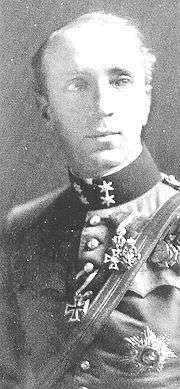Georg von und zu Franckenstein
Georg Freiherr von und zu Franckenstein (later Sir George Franckenstein) (1878 - 15 October 1953) was the eldest son of Karl Baron von und zu Franckenstein (1831–1898) and his wife, Elma née Countess von Schönborn-Wiesentheid (1841–1884) and a member of the Franckenstein family.

His younger brother was the composer and General Intendant of Munich Clemens von und zu Franckenstein.
Georg spent his youth between Franconia and Vienna. After having visited the famous Schottengymnasium and his politics and law studies at Vienna University, he joined the Ministry of Foreign Affairs of the Austrian Empire to become a career diplomat. His first assignments led him to Washington, followed by the Russian imperial Court in St. Petersburg and to Rome. After a short intermezzo in the Ministry of Foreign Affairs in Vienna, he was ordered to the Japanese Imperial Court, to India and finally to Brussels before becoming „K+K Kommerzdirektor“ of the Austrian Embassy in London. The beginning of the first world war in 1914 forced him to leave Great Britain.
He was afterwards a member of the peace delegation for Austria 1919 in Saint-Germain.
On 19 October 1920 he returned to London as the diplomatic representative of the new Republic of Austria. He was then Austrian Minister to the Court of St. James for 18 years, from 1920-1938.
During the first world war, Franckenstein was, inter alia, diplomatic representative of the Habsburg-Monarchy in the German occupied territories of Belgium and in 1918 in the Caucasus, occupied by the central powers, where he tried together with his German colleague General Kress von Kressenstein to help the haunted and hungry Armenian refugees.
In the early 1920s he could clear the massive financial tilt of his country, thanks to his contacts in London and through arranging an international Government Bond.
Due to his sumptuous and representative style of living, especially by hosting concerts and masked balls, he strongly assured his high society esteem, where—although aristocracy had been abolished in Austria by 1919—he was still addressed as "Baron Franckenstein".
In 1935 he was awarded with an honorary degree in Oxford.
Being an opponent of the Nazis, he lost his diplomatic position after the Anschluss of 1938. In order to organize the fight against the Nazis out of the UK and help anti-Nazi countrymen, he remained in London and was knighted on 26 July 1938 by King George VI of the United Kingdom. He became Grand Cross Knight Commander of the Royal Victorian Order.
Together with his brother Clemens, his cousins Josef von Franckenstein, an active intelligence and field agent at the OSS and Heinrich von Franckenstein, he was trying to keep up an active network and opposition against the Nazi-Regime out of London. Unlike networks of some occupied countries, this activity was not successful, as the majority of Austrians at the time identified themselves as German. In 1939 he married young Editha King and became a British subject one year later.
After the 2nd world war, Austrian state representatives offered him to run for Austria's first president, which he cordially declined, estimating his chances slim indeed, while feeling obliged to his new fatherland.
Franckenstein and his brother Clemens were also close friends of Hugo von Hofmannsthal, with whom they had an active letter correspondence.
George and Editha were killed together in a plane crash outside Frankfurt on 15 October 1953, and their only son Clement, an actor, was raised by their British friends.
References
- George Franckenstein: Facts and features of my life
- Georg von Franckenstein: Zwischen Wien und London. Erinnerungen eines österreichischen Diplomaten, Leopold Stocker Verlag, Graz 2005. ISBN 3-7020-1092-0
Further reading
- Patsch, Sylvia M.: Österreichische Schriftsteller im Exil in Großbritannien. Wien 1985, S. 210ff.
- Time, 8. August 1938; http://www.time.com/time/magazine/article/0,9171,931443,00.html
- Weinzierl, Ulrich: Hofmannsthal. Skizzen zu seinem Bild. Wien, Paul Zsolnay Verlag, 2005.
- Hofmannsthal, Hugo von: Briefwechsel mit Clemens von Franckenstein, Rombach Druck- und Verlagshaus, ISBN 978-3-7930-9182-0